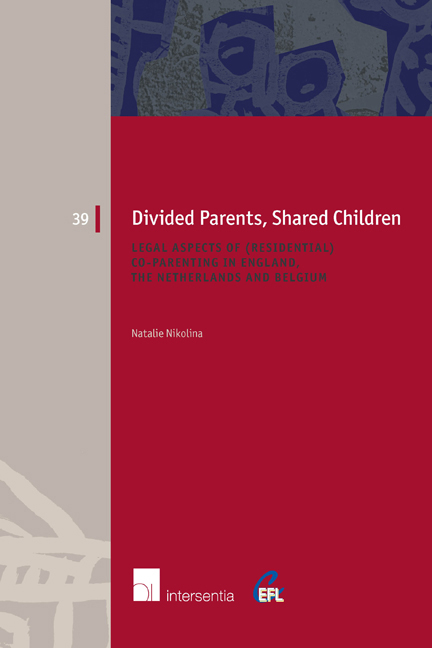 Divided Parents, Shared Children
Divided Parents, Shared Children Book contents
- Frontmatter
- Acknowledgements
- Contents
- Chapter 1 Introduction
- Chapter 2 International and European framework
- Chapter 3 The English legal system
- Chapter 4 The Dutch legal system
- Chapter 5 The Belgian legal system
- Chapter 6 Socio-psychological aspects of residential co-parenting
- Chapter 7 Comparative synthesis
- Chapter 8 Conclusions and recommendations
- References
- Samenvatting
- About the author
- European Family Law Series
Chapter 1 - Introduction
Published online by Cambridge University Press: 12 December 2017
- Frontmatter
- Acknowledgements
- Contents
- Chapter 1 Introduction
- Chapter 2 International and European framework
- Chapter 3 The English legal system
- Chapter 4 The Dutch legal system
- Chapter 5 The Belgian legal system
- Chapter 6 Socio-psychological aspects of residential co-parenting
- Chapter 7 Comparative synthesis
- Chapter 8 Conclusions and recommendations
- References
- Samenvatting
- About the author
- European Family Law Series
Summary
STUDY BACKGROUND
Never before have there been as many changes in the position and the structure of the family in Dutch society as in the last 50 years. Both our concept of what it means to be a parent and what consists of a family unit have evolved and are still evolving drastically. As the law is in place to protect and reflect society, modern family law is also rapidly reforming to accommodate the many societal changes.
In the area of post-separation parenting, the demand for the genders to be treated equally, the growing awareness of not just the need to protect children, but also their intrinsic rights, and the growing number of separations and the establishment of new families have required the law to find new solutions as to how to deal with post-separation issues.
‘[T]he norms associated with fatherhood have shifted in recent decades toward a new concept that embraces both economic support and childcare responsibilities’. The growing awareness of the importance of contact with fathers for the children's well-being after parental separation, and the growing involvement of fathers in childcare during marriage, have caused fathers to be more involved in their children's lives after parental separation. Subsequently, fathers have started to demand more favourable contact, care and residence arrangements in the courts, and they want to see greater legal equality between parents.
As the position of fathers changed, so did the position of children. This change had come about even earlier and on a more international scale. More and more international and European instruments emphasize children's rights while the best interests of the child have become the main consideration in national family law. How to safeguard these interests when more and more children experience the often traumatic situation of their parents’ separation is a question that is at the forefront of a great deal of discussion among policy makers, legislators and legal professionals. In the Netherlands alone, approximately 57,000 children a year experience parental separation. That is more than one in four children.
- Type
- Chapter
- Information
- Divided Parents, Shared ChildrenLegal Aspects of (Residential) Co-Parenting in England, the Netherlands and Belgium, pp. 1 - 8Publisher: IntersentiaPrint publication year: 2015
